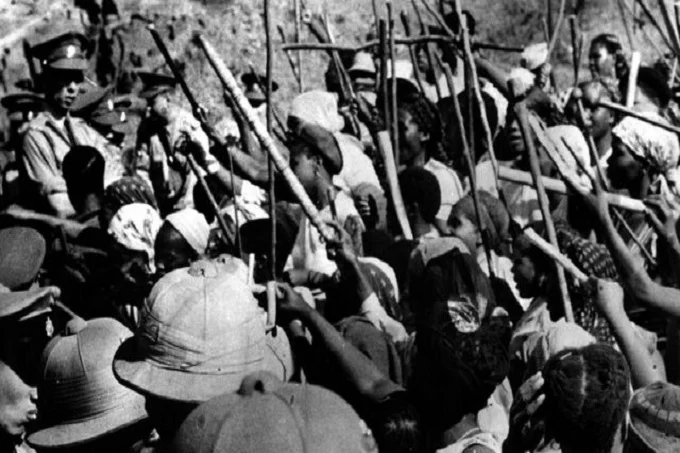What caused the Aba Women’s riot of 1929

The Aba Women’s Riot of 1929 was a two-month rebellion that broke out in Nigeria led by local market women belonging to the Igbo tribe against the excessive powers of the British government and its mandate leaders at the height of colonialism. Traditional values were severely tested during colonialism, and Africa lost much of its way of life amidst the strong fusion of different ethnic groups in colonial states. The Aba Women’s Rebellion is, unfortunately, one of the last narratives of true African values.
According to Igbo tradition, the Aba Women’s Riot was triggered by the imposition of an exploitative tax policy on women who were exempt from taxes. The plot and results of this event provide just one of many examples in Africa’s long history in which the continent was pushed to embrace classical liberal values, creating a stark contrast with local traditions and threatening the freedom of the peoples.
Indirect colonial rule
Learning from the shortcomings of the French assimilationist approach in its African colonies and taking into account the British government’s reluctance to commit itself financially to its protectorates, the governor-general in charge of Nigeria, Frederick Lugard, adopted a system of indirect rule.
This system allowed traditional chiefs and mandate chiefs – that is, indigenous elites chose by the British to administer colonial territories – to serve as representatives of the Queen of the United Kingdom rather than directly employing British personnel. This allowed the colonialists to save a large amount of workforce employed in the many mines of Igboland.
But while the British were busy exploiting the colony’s resources to industrialize Britain, the leaders of the mandates became powerful and despotic, going so far as to extort money from the people subject to them by imposing fines following unreasonable charges. They seized private property at will and brutalized anyone who opposed their authority.
In contrast, in pre-colonial Igboland, leaders were always elected, not imposed. Their administrative systems were highly decentralized and egalitarian. They rejected any form of concentration of power; instead, they implemented systems of decentralizing authority through the creation of peer groups and clans that together constituted the community.
Prelude and outbreak of protest
In the 1920s, the British government was criticized for failing to develop the colonies despite gaining much from them. This was the same period when Britain was recovering from the financial loss of World War I.
In order to raise money, the colonialists had to resort to internal means of revenue generation: these included imposing direct taxation on women and calculating the number of children, head of cattle, and other personal property as taxable assets.
In order to be aware of the exact number of the population, the English organized a census, which the people immediately identified as closely related to the new tax policy. The market women became concerned about the possible effects of the new tax law on their businesses and how they would keep up with the many financial burdens imposed by the mandate leaders.
They thus decided to consult with the colonial government, asking to be allowed to preserve their tax-exempt status, but their request was denied. Wanting to defend their freedom at all costs, the women engaged in a protest against the British government, continuing not to pay taxes
However, during one of the counts, an altercation between a census officer and a widow in one of the villages resulted in an assault on the widow. The news reached a gathering of market women in the town square as they discussed the new tax policy. The women, enraged, mobilized their colleagues from neighboring villages and went to the office of the local chief warrant officer to demand his resignation.
The protest grew from a peaceful sit-in into the fiercest resistance the British had ever faced in their African colonies.
The consequence was the destruction of government infrastructure and factories in Igboland, which colonial troops and police tried to counter with brutal force. Over 25,000 women were involved, dozens of whom were killed or severely beaten.
The results of the Aba Women’s riot of 1929
As a result of the protests, women’s position in society improved dramatically, and in some areas, they were even able to replace their mandate leaders. More women were appointed to serve in the Native Courts.
After the riot of 1929, women’s movements were very strong in Ngwaland, and they inspired many events of the 1930s, 1940s, and 1950s; these included the tax protests of 1938, the mill protests of the 1940s in Owerri and Calabar provinces, and the tax revolt in Aba and Onitsha in 1956.
British district officials were called in on some occasions, and security forces were forced to break up the protests. On those occasions, at least 50 women were shot dead and another 50 injured. On the other hand, the women themselves never seriously injured anyone against whom they were protesting.
Conclusions
Before long, news of the resistance spread around the world, inspiring other minority groups in Africa. The rebellion, of course, did not end colonialism, but it strengthened the support base of that part of the indigenous administration that tended to be inclusive and, to some extent, the struggle for independence. The courage of these women in preserving their property and traditional rights while fighting a powerful system underscores Africa’s spirit of intolerance towards tyranny.
In fact, many African tribes were organized on anarchic principles and thrived without central planning, basically without a government. These included the Igbo and Ijaw in Nigeria, the Tallensi in Ghana, the Logoli in Kenya, Tonga in Zambia, and the Nuer in South Sudan.
To a greater or lesser extent, most African traditional societies manifested “anarchic elements”, some of which persist to this day.
Traditional values were severely tested during colonialism, and Africa lost much of its way of life amidst the strong fusion of different ethnic groups in colonial states. The Aba Women’s Rebellion is, unfortunately, one of the last narratives of true African values.
Unfortunately, contemporary Africa is the opposite of what the region’s ancestors resolutely fought to achieve. The continent is lost in poverty while tyrants and their cronies plunder resources without being held accountable. But for today’s few African libertarians, the courage of Aba’s women should inspire greater efforts to combat this power.




